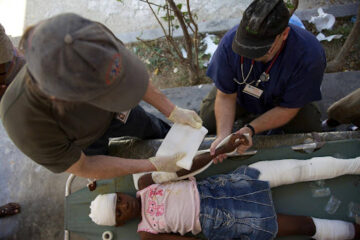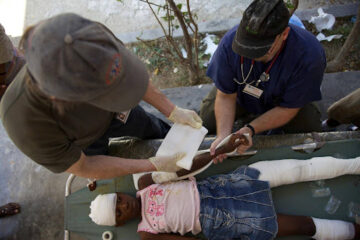Background
In December 2016, The World Health Organization (WHO) made an urgent request for assistance for the conflict in Iraq for trauma and stabilization care for people wounded in the conflict. Patients presenting with grave injuries were dying before reaching the hospital because they did not have access to the appropriate care necessary to keep them alive in the field and during transport to the hospital where they would receive definitive, surgical trauma care.
NYCMedics Response
NYC Medics immediately stepped up to this crucial call to action, and worked closely with the WHO on mounting a medical mission to operate a Trauma Stabilization Point (TSP), a field clinic providing emergency care and stabilization to trauma victims located behind the front lines of the military offensive in Mosul for the obvious purpose is to prevent the death of men, women, and children injured by the conflict.
By January of 2017 NYCMedics was working as an implementing partner in Mosul.
Throughout 2017, we operated a Trauma Stabilization Point (TSP) behind the front line of the offensives in Mosul, Tai ‘Afar and Hawija filling a critical gap in the response efforts. TSPs were the first point of medical contact with gravely injured people providing vital trauma care and stabilization, readying patients for transport to a hospital for higher level medical or surgical care. The NYCMedics TSP was continually staffed and operated 24 hours a day, seven days a week.
As a mobile unit, our TSP relocated seven times in effort to maintain a close proximity to the front and intervene during the vital ‘Golden Hour” of care providing rapid evaluation and resuscitation. The majority of patients were evaluated, triaged, treated, and dispositioned to receiving facilities within 15 minutes of arriving. With NYC Medics TSP located between the front lines and the distant field hospitals, our volunteers provided life-saving care to more than 2,600 patients.
Additionally, NYC Medics coordinated all TSPs and prehospital care as well as successfully implemented a referral coordination system that managed over 1,600 patient transfers in real-time. NYC Medics played an integral part in the day-to-day management of patient transfers between field hospitals and from field hospitals to tertiary referral hospitals, helping to smooth the communication between various partner organizations and serving as a centralized focal point for referrals. Through this referral coordination, NYC Medics helped to ensure that patients were brought to the hospitals best suited to caring for their specific needs, that patient distribution through the field hospital system was equitable especially during mass casualty incidents, and that patient movements from facility to facility occurred as smoothly as possible, with obstacles identified and addressed in real-time.
5,787 Miles from NYC
2,655 Trauma Patients Served
157 Volunteers

